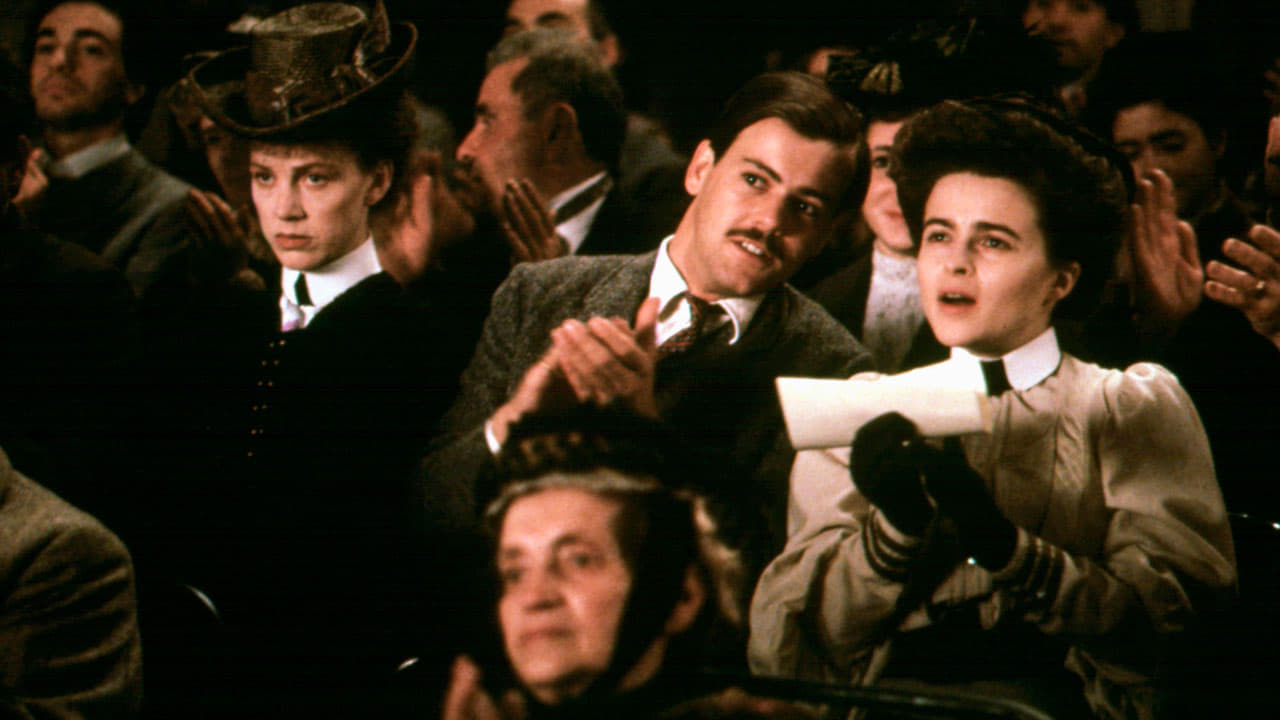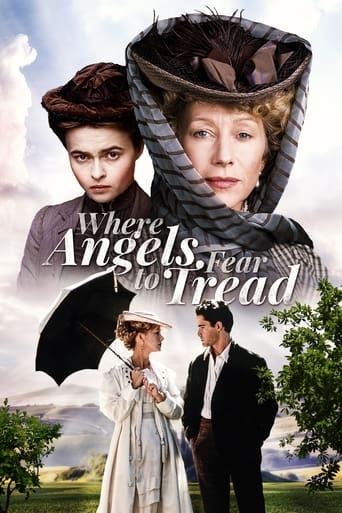

Action and inaction, and their consequences, are the themes of this film. Lilia takes action by marrying Gino. But soon enough, he forbids her the freedom she is used to and beats her up for talking back to him. In doing this, he is acting as he thinks he is supposed to act – playing the role of 'Italian husband' – but it is a role he is convinced he has to play. He is also a total cad, cheating on his rich old wife with a young local woman. Lilia has a child with Gino, and dies in childbirth. He is distraught, but as Philip says (approvingly) later on, Gino is comfortable with his contradictions, and he appears well over her soon after the funeral, planning a new bride to look after his son for him. Six months later, Philip, his sister Harriet, and Lilia's friend Caroline are all in Italy to take the child away. Caroline sees Gino being so loving towards his child, and faints. She is besotted: she sums up the key dilemma of the whole film when she says to Philip that either the child will be brought up badly but with love in Italy, or well but without love in England, and that he, Philip, must choose which he thinks should happen and make it happen. That said, Caroline blames herself for her own inaction when Lilia married Gino. Philip's ineffectual nature is at the heart of the film: he is acting for his mother when he comes over to Italy, and he needs to actually decide what he thinks is right. But he doesn't. Harriet steals the child when Philip fails to take action quickly, and Philip does not stop the carriage when he could have stopped it. He decides – by not deciding – to go along with Harriet and take the child, even though he has not decided that this is the right thing to do. He holds himself responsible for the death of the child in a very touching scene where he allows Gino to beat him up.Philip finally makes a decision at the end of the film to ask Caroline to marry him, but he cannot get the words out before she heads him off by telling him that she loves Gino. 'So do I', replies Philip, and he does not laugh at her when she invites him to laugh at her. The film ends with the two of them hugging, and long, fraternal hug. Will they ever marry? We don't know. He lists the good things they had shared with each other, while she just tells him that she loves Gino – those good things are no match for pure love, but she can never have Gino. You are left hoping that they will marry one another, but still doubting whether they will. Meanwhile, the character who really suffers in the film is Harriet, the uptight sister. She is the comic turn, standing up and telling everyone to stop cheering at the opera. Stop enjoying yourself, she is saying – she doesn't enjoy herself at any point in the film, in England or in Italy. She does not try to understand Italian ways. She's there to do a job and does it. But she botches the job. She steals the baby and it is clear that she is not comfortable holding it. Then in the crash, she lets go of the baby, who dies. She is directly responsible for killing the child through her actions and inadequacies – why did she not hold on? The bible-reading moral woman has made a mistake that has cost a child's life, and she is the only one that is crushed at the end. She's the only one whose moral world will have to change for her to recover from the events in Italy.Gino also makes no effort to understand British ways for Lilia, and treats her disgracefully, as Harriet points out – fairly - echoing her mother's comment that a country can be judged by the quality of its men: a man who is not chivalrous towards women is no good. But he is not punished at the end - he is left a way back to happiness. Philip is forgiven for his ineffectualness, and shows signs of learning to become decisive. Gino is forgiven for being a typical unreconstructed Italian male of his class, for beating his wife, but shows no real signs of changing at the end: he was not such a bad man after all: Italian men of that time, place and class just acted like that. Personally, I agree with Harriet on that one, and forgive a wife-beating man less easily. Harriet herself is not forgiven for her British reserve: maybe she is punished so severely not for being wrong, but for not being nice. Caroline is the only one with nothing to be forgiven. The film takes a critical attitude towards British reserve and is also somewhat critical of Italian inconsistency. The two characters hugging at the end are the only two that come out of it favourably. Philip and Caroline are the heart of the film, and the representatives of 'us' the viewers. The other characters have less depth, but that is inevitable: after all, while Philip and Caroline understand both cultures, Harriet and Gino never understand the 'other', nor do they ever properly try to, and both of them end up killing someone as a result: Gino kills Lilia, certainly according to Harriet, while Harriet blames herself for killing the baby. Their lack of understanding causes death. Harsh judgement: 'you'd better try to understand other cultures' is the message of the film. But it is only Harriet who is left without an obvious pathway towards redemption. For all her miserableness throughout the film, I was left feeling very sorry for her at the end .
... View MoreI read the book in my late teens (I was completely unaware of the closet gay theme, or that's what the critics say!) and was singularly unimpressed. I saw the DVD in my sixties and was even less impressed! The theme is buttoned up Brits in sunny, laid back Italy, and how they are unable to adapt or cope. We see it all in the first twenty minutes and thereafter the film has nowhere to go, but to re-emphasise the production values, the costumes and the scenery. And, as with 'Avatar' it is not enough to make a film. The characters are uninteresting or over the top, and lack any depth. Various crucial character motivations are left unexplained, the acting is stilted or over the top (both Helen Mirren and Judy Davis), and the crucial plot elements like the death of a baby barely make a mark (I don't count the silly, presumably homoerotic, punching of the Rupert Graves character by the grieving Italian father!). As with other Foster adaptations - why has he got the reputation as a leading English novelist? It is grindingly stilted and of its' time (or is it the one we've been brainwashed into accepting - eg buttoned up middle class Brits?). There were the social changes and the Boer War during Edwardian times!!! Poor, I've dumped the free DVD in the Carity Shop!
... View MoreCharles Sturridge's large-screen version of E M Forster's tragicomic masterpiece of class and culture clash is as buttoned up as the corsets and starched shirts it's characters wear. The movie is wrong-footed and scenes don't build to anything. Everything is held in reserve until the whole film seems on the verge of disappearing, (which it finally does, unsatisfactorily, racing through the final scenes). While Helena Bonham Carter and Rupert Graves just about get their characters, (you want to slap them, and hard, but at least you feel as if they are real), and Helen Mirren is full of life, (until she dies in childbirth), Judy Davis' performance as mad aunt Harriet takes her usual screaming harpy to unrestrained heights even for her, while Giovanni Guidelli's bland, handsome romantic hero is hopelessly inadequate. This is the team that made "Brideshead Revisited" for television; perhaps if they had six hours of TV time they might just have pulled this off as a decent series. Nevertheless, I can't help feeling that as it stands Merchant/Ivory could have made the masterpiece that Forster's book so obviously is.
... View MoreSuch is the credo of a trio of Edwardian English gentry who travel to Italy to save a new born baby from the clutches of its Italian father upon the death of its English mother. "Where Angels Fear to Tread" is an excellent film in need of a story. A well crafted, well acted, well directed period piece (circa 1906), the film peers deeply into the marginally interesting group of characters, their relationships and idiosyncrasies, and their difficulty bridging the English/Italian culture gap. Unfortunately this tedious work only seems to get interesting about the time credits roll and one is left wondering what happened to the on screen "To Be Continued" declaration. An okay watch for those into the subtleties of European period films with little to offer all others.
... View More